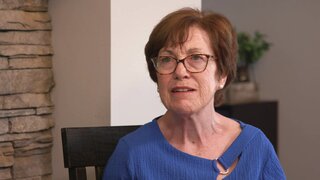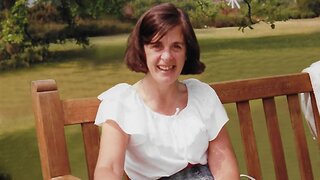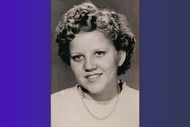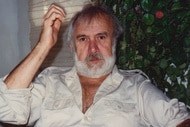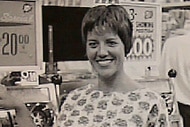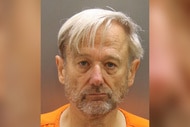The ‘Cold Justice’ Team Helps Investigate The ‘Savage’ Murder Of A Seminary Student
In 1990, Elizabeth Mackintosh, a 50-year seminary student, was hung and stabbed in a chapel bathroom.
The brutal murder of a seminary student in Creve Coeur, Missouri has gone unsolved for over 32 years.
On “Cold Justice,” airing Saturdays at 8/7c on Oxygen, former prosecutor Kelly Siegler and investigator Steve Spingola were at the scene to work the case with members of the Creve Coeur Police Department.
Elizabeth Mackintosh, 50, was a Scottish immigrant and a student at Covenant Theological Seminary, where she also worked cleaning the chapel. On the morning of March 26, 1990, she was found murdered.
“She was brutally attacked, beaten, hung in the men’s restroom, and stabbed,” said Siegler. “ …This is one of the most savage and messy and painful homicides I’ve ever heard of.”
Local officials acknowledged that the age of the case, plus the lack of hard physical evidence, eyewitnesses, and forensics create a difficult challenge. Retired captains who actually worked on this original case joined this “last-ditch effort.”
The new team assured the victim’s sister, Helen Janet Miller, that they were on the case. Miller called the crime “an unspeakable blow,” noting that faith helped her family endure.
Siegler and Spingola dove into the case and learned that after an 11-year nursing career in Scotland, Mackintosh came to the seminary. Her plan was to get a degree in counseling and possibly her seminary license. She worked cleaning the chapel and would start her job around 4:30 a.m.
Originally, it was believed to be a hanging because the victim had a ligature around her neck. But there was blood all over the floor, and officers quickly determined that it wasn’t a suicide. She had puncture wounds in her neck, defensive wounds to her hands, and bruises all over her body. She’d been hung by a VCR cord.
There were no signs of sexual assault or robbery. Based on witness statements, the murder occurred between 4:50 and 6:20 a.m.
The cord and pieces of clothing were sent out for DNA testing, while the “Cold Justice” team reviewed the suspects with Creve Coeur officials.
Michael Johnson, a seminary student, was Mackintosh’s work supervisor. Their relationship was contentious: They had disagreed over cleaning supplies and because “she went over his head and spoke to his boss,” an officer said.
Johnson was known to have a short fuse and had allegedly been abusive to his wife and children. It also set up alarm bells that there was a discrepancy in his initial statement about when he was in the chapel on the morning of the murder. He told police he was there at 7:10 a.m. but had told a witness he had a 6:30 a.m. meeting with Mackintosh.
Now-deceased student Eugene Smith, then 45, also came onto police’s radar when they learned that he had been arrested for attempted rape with a knife in 1987. Smith was acquitted at his trial on that charge. But after he left the seminary, he was arrested and convicted of armed robbery with a knife, officials said.
Another possible suspect was George Johnston, then 43, who was a campus librarian. He was fired after the murder when a security audit revealed that in 1971 he had been involved in the attempted sexual assault of a woman in a hospital near the seminary.
Then there was now-deceased David Winecoff, then 37, who was the victim’s pastor. There was reported contention over Mackintosh’s more liberal beliefs, which had led her to apply to a seminary school in Florida. Mackintosh had shown Winecoff her acceptance letter the night before her murder. His fingerprints were on that letter, which was found at the scene of the homicide.
The challenge after 30 years, said Siegler, is “finding witnesses who are still around and have a good memory from that day.”
Investigators reconstructed the murder at the actual crime scene with ballistics expert Chris Robinson.
“It’s unclear if the killer’s true intent was to try to stage this death as a suicide,” said Spingola. “But he was clearly trying to strangle her to death.”
From the reconstruction investigators theorized that the killer stabbed Mackintosh to hasten her death, and that Mackintosh’s acceptance letter at the scene may have come out of her pocket during the attack.
“I can’t imagine a more horrible place and way to die,” said Siegler.
Mackintosh was fully clothed when she was killed, and investigators found no evidence of a sexual motive.
“This was personal,” said Spingola. “This was rage.”
Based off this assertion, the team eliminated Smith and Johnston as suspects. However, Michael Johnson, the victim’s boss, had a fraught relationship with her.
Danny Rapert, a former detective with the Creve Coeur Police Department, went over Michael Johnson's recorded 1990 interview tape to see if the team could pick up signs of deception.
Johnson claimed in his statement that he’d never gone into the men’s room where Mackintosh was killed. But during that interview he also said, “I went back to the rest ... uh chapel.”
David Winecoff’s widow corroborated his account of his whereabouts on the morning of the murder. The team felt confident that they could eliminate Winecoff as a suspect.
The DNA analysis came back and found no male DNA present on the cord or the victim’s shirt. Testing of Mackintosh’s jeans was inconclusive. Instead, they would have to rely on witness testimony to make their case.
Investigators interviewed Thomas Larson, who was Johnson’s boss in March 1990. He described the suspect as “smart, but not necessarily emotionally stable.” He was prone to arrogance and had a short fuse, he said.
The team also reviewed interoffice correspondence between Johnson and Mackintosh days before the murder. In his memo he chastised her for not following the chain of command about the cleaning supplies. In her response, she stood up for herself and corrected his spelling errors in his memo.
“These notes really paint a clearer picture of the conflict between Elizabeth and Michael in the days before the murder,” said Siegler.
Johnson was denied a recommendation from the seminary and was also going through marital problems at the same time this feud was happening.
“It wasn't just cleaning supplies. It was the last straw,” said Siegler.
Creve Coeur Police Department Det. Charles Parker and Spingola traveled to Tomball, Texas to interview Michael Johnson. They tracked him down to his job at a home improvement center and waited in the parking lot for him to leave work. But Johnson declined to speak about the case.
Still, investigators believed that they had a strong case and they shared that with Miller, who expressed her gratitude for the efforts on behalf of her beloved sister.
“It’s wonderful that you have a way forward,” she said. “Perhaps they can bring it to a conclusion now.”
Creve Coeur Police Department Sgt. Douglas Manninger and Parker were ready to bring the facts of the case to the St. Louis County prosecutor.
“It’s a circumstantial evidence case. But it's still a good case,” said Siegler. “This is as close as Elizabeth’s case will ever be to getting justice.”
To learn more about the case, watch “Cold Justice,” airing Saturdays at 8/7c on Oxygen. You can stream episodes here.


